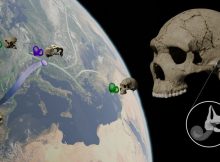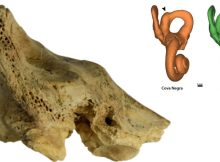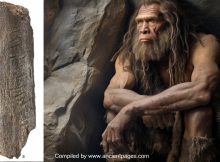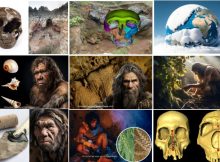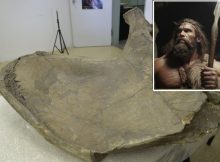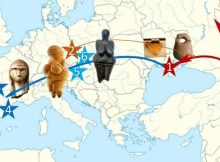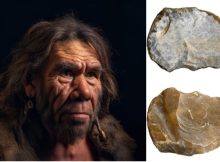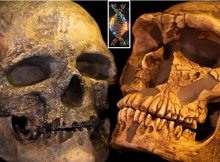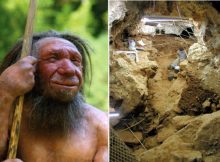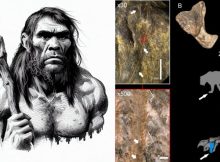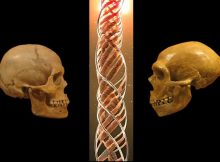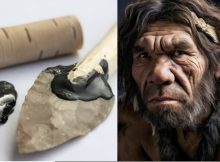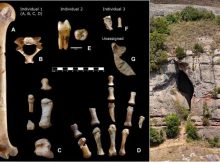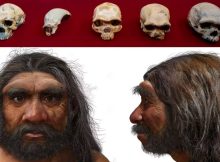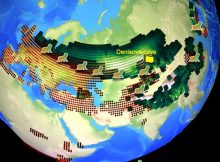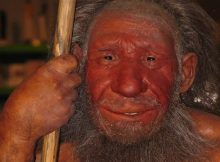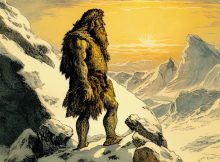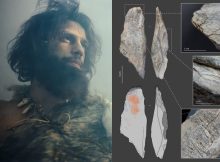Neanderthals Archive
Paleontology
Conny Waters - AncientPages.com - The human face is notably different from that of our fossil relatives and ancestors. It is characterized by being significantly smaller and more
Read More
Evolution
Jan Bartek - AncientPages.com - Recent research into the inner ear morphology of Neanderthals and their ancestors offers new insights that challenge the prevailing theory regarding their origins.
Read More
Evolution
Conny Waters - AncientPages.com - The ongoing debate about the disappearance of Neanderthals remains a fascinating topic in scientific research. Previous studies have established that Neanderthals, along with
Read More
Evolution
Conny Waters - AncientPages.com - A team of researchers, co-led by experts from University College London (UCL), has formally identified genetic variants that influence the morphology of human teeth.
Read More
DNA
Jan Bartek - AncientPages.com - After modern humans migrated from Africa, they encountered and interbred with Neanderthals, leading to the presence of approximately 2–3% Neanderthal DNA in the genomes
Read More
DNA
Jan Bartek - AncientPages.com - A recent analysis of DNA from ancient modern humans (Homo sapiens) in Europe and Asia has provided a more precise timeline for when Neanderthals
Read More
Archaeology
Jan Bartek - AncientPages.com - Manot Cave in Galilee, Israel, has provided significant insights into early human history. It reveals evidence of ritualistic gatherings dating back 35,000 years—the
Read More
Archaeology
Jan Bartek - AncientPages.com - Inside the Maltravieso Cave in Spain, researchers have carefully examined several fascinating ancient rock paintings. Dating cave art is typically challenging because mineral-based
Read More
Evolution
Jan Bartek - AncientPages.com - A recent study by researchers from London's Natural History Museum and the Institute of Philosophy at KU Leuven has strengthened the argument that Neanderthals
Read More
Human Beginnings
AncientPages.com - The prevailing narrative of how humanity came about seemed straightforward enough: in Europe, the last Neanderthals bowed out as Homo sapiens began arriving on the continent around 40,000
Read More
Archaeology
Conny Waters - AncientPages.com - A new study from the Australian National University (ANU) reveals that an unexplored area in Spain's Southern Pyrenees foothills is providing insights into
Read More
DNA
Jan Bartek - AncientPages.com - The study of ancient hominins, particularly Neanderthals, has been a subject of scientific inquiry since the discovery of their bones in 1856. This
Read More
Archaeology
Conny Waters - AncientPages.com - Researchers from Binghamton University, State University of New York, have documented the first known instance of Down syndrome in Neandertals. An international team
Read More
Featured Stories
AncientPages.com - Why did humans take over the world while our closest relatives, the Neanderthals, became extinct? It’s possible we were just smarter, but there’s surprisingly little evidence
Read More
Archaeology
Jan Bartek - AncientPages.com - A significant archaeological discovery was made during excavations in the 1950s at the Dziadowa Skala Cave in the Czestochowa Upland region of southern
Read More
Human Beginnings
AncientPages.com - The Neanderthals (Homo neanderthalensis) fascinate researchers and the general public alike. They remain central to debates about the nature of the genus Homo (the broad biological
Read More
Archaeology
Jan Bartek - AncientPages.com - Researchers have discovered stone tools bound together by a multi-component adhesive, providing further substantiation of the intellectual capacity of Neanderthals. These artifacts represent
Read More
Archaeology
Jan Bartek - AncientPages.com - In 2023, scientists presented several interesting studies that gave us a better knowledge of our ancient human ancestors. In this article, we selected
Read More
Biology
Conny Waters - AncientPages.com - A new research paper finds that genetic material from Neanderthal ancestors may have contributed to the propensity of some people today to be
Read More
Artifacts
Jan Bartek - AncientPages.com - Our long-gone ancestors, the Neanderthals, did not differ that much from modern humans. Like us, the Neanderthals were curious about the world around
Read More
Archaeology
Jan Bartek - AncientPages.com - Hunting the now-extinct straight-tusked elephant (Palaeoloxodon antiquus) was widespread among Neanderthals, concludes a research team. In the study published in Proceedings of the
Read More
Archaeology
Jan Bartek - AncientPages.com - Recent research has shown that engravings in a cave in La Roche-Cotard (France), which has been sealed for thousands of years, were actually
Read More
Archaeology
AncientPages.com - How did our species, Homo sapiens, arrive in Western Europe? Published in Nature Ecology & Evolution, our new study analyzes two skull fragments dating back between 37,000 and 36,000
Read More
Evolution
AncientPages.com - When we think of Neanderthals, we often imagine these distant ancestors of ours to be rather brutish, dying at a young age and ultimately becoming extinct.
Read More
Archaeology
Jan Bartek - AncientPages.com - Archaeologists working in the western part of Racibórz, called Studzienna, Poland, have unearthed stone tools that are 130,000 years old, or possibly even
Read More
DNA
AncientPages.com - For generations, Neanderthals have been a source of fascination for scientists. This species of ancient hominim inhabited the world for around 500,000 years until they suddenly
Read More
DNA
Conny Waters - AncientPages.com - By analyzing genomes up to 40,000 years old, scientists have traced the history of migrations between Homo Sapiens and Neanderthals. About 40,000 years
Read More
DNA
Jan Bartek - AncientPages.com - Modern humans migrated to Eurasia 75,000 years ago, where they encountered and interbred with Neanderthals. A new study published in the journal Current Biology shows
Read More
Archaeology
Jan Bartek - AncientPages.com - The fact that Neanderthals were able to make a fire and use it, among other things, for cooking, demonstrates their intelligence. "This confirms
Read More
Archaeology
Jan Bartek - AncientPages.com - Neanderthals hunted cave lions and used the skin of this dangerous carnivore, a new study has shown for the first time. Excavations at
Read More
Evolution
Jan Bartek - AncientPages.com - A team of evolutionary scientists has presented evidence the Neanderthals vanishing when Homo sapiens emerged in Europe may have been coincidental. In a
Read More
DNA
AncientPages.com - When researchers used DNA from the 10,000-year-old “Cheddar Man”, one of Britain’s oldest skeletons, they unveiled what the first inhabitants of what now is Britain actually
Read More
Archaeology
Jan Bartek - AncientPages.com - Previous studies show Neanderthals invented or developed birch tar making technique independently from Homo sapiens. Studying prehistoric production processes of birch bark tar
Read More
Archaeology
Jan Bartek - AncientPages.com - Many years ago, in 1986, the Archaeology Museum of Catalonia in Spain received a box. The gift was a donation from amateur paleontologist
Read More
Evolution
AncientPages.com - In 1933 a mysterious fossil skull was discovered near Harbin City in the Heilongjiang province of north-eastern China. Despite being nearly perfectly preserved – with square
Read More
Human Beginnings
Jan Bartek - AncientPages.com - An international team of scientists has found evidence that past changes in atmospheric CO2 and corresponding shifts in climate and vegetation played a
Read More
DNA
AncientPages.com - Geneticists have now firmly established that roughly two percent of the DNA of all living non-African people comes from our Neanderthal cousins. It’s difficult to imagine
Read More
Archaeology
Jan Bartek - AncientPages.com - Of the six or more different species of early humans, all belonging to the genus Homo, only we Homo sapiens have managed to
Read More
Evolution
Jan Bartek - AncientPages.com - Long before the invention of agriculture, humans already knew how to process cereals and other wild plants into a flour suitable for food—and
Read More
Archaeology
Jan Bartek - AncientPages.com - Were anatomically modern humans the only ones who knew how to turn bone into tools? A discovery by an international team at the
Read More
Archaeology
Conny Waters - AncientPages.com - Previous archaeological excavations in Jersey revealed Neanderthals visited La Cotte de St Brelade, a coastal cave for over 100,000 years. The cave was
Read More
DNA
Jan Bartek - AncientPages.com - Recent scientific discoveries have shown that Neanderthal genes comprise some 1 to 4% of the genome of present-day humans whose ancestors migrated out
Read More


